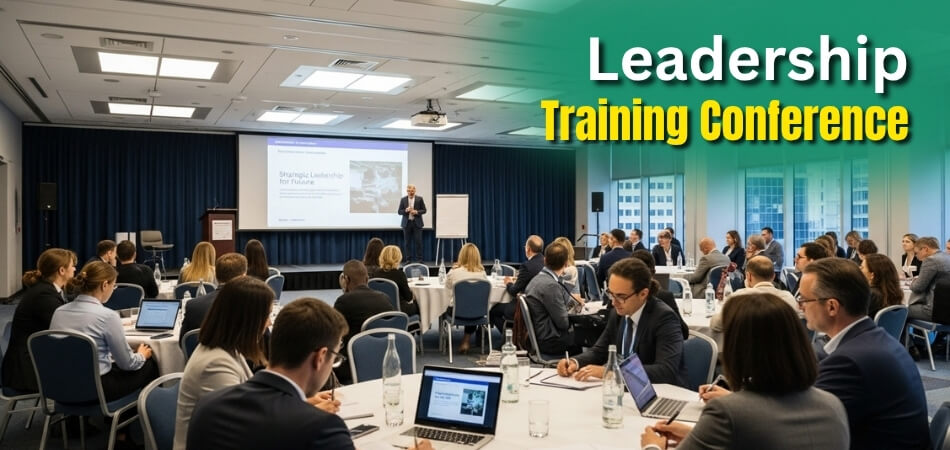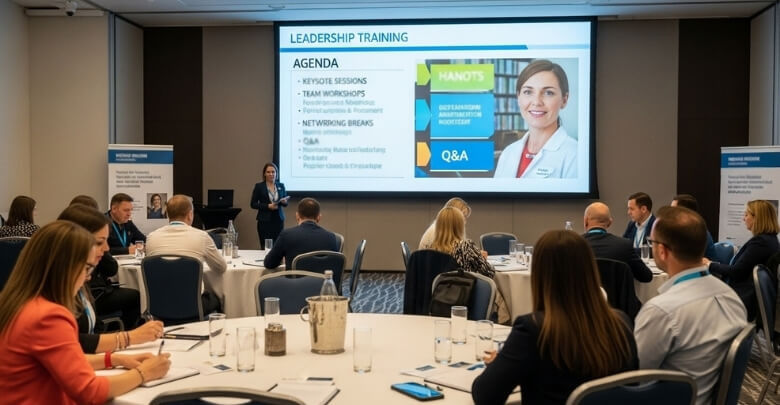Conferences are often where professionals gather to learn, share experiences, and grow their skills. They create spaces for networking, new ideas, and practical knowledge that can be applied in real work settings. Among these, some events focus on developing one of the most important qualities in any field, like leadership.
So, what is leadership training conference?
A leadership training conference is an event where people learn how to become better leaders. It includes talks, workshops, and group activities. Experts teach skills like teamwork, decision-making, and communication. People also meet others, share ideas, and grow their careers. Students and future leaders can also join to learn and improve.
Keep reading to see how these conferences can help you become a stronger leader.
What is Leadership Training Conference?
A Leadership Training Conference is an event that brings together professionals, executives, and aspiring leaders to build essential leadership skills. These conferences include expert-led sessions, workshops, and discussions that focus on communication, decision-making, team management, and handling change. Below are the main elements that make these conferences impactful.
Expert-Led Workshops
Workshops are designed to help participants practice real leadership skills through interactive and practical learning methods. Experts guide attendees on topics such as strategic thinking, communication, and team management in dynamic settings. These sessions allow leaders to explore challenges they face and learn strategies to improve daily decision-making. By combining theory with practice, participants leave with tools they can apply immediately.
Moreover, many sessions include case studies, role-playing activities, and problem-solving exercises to encourage active participation from all attendees. This approach makes learning more engaging and ensures that knowledge is retained long after the event ends. Attendees develop confidence by applying lessons in simulated but realistic scenarios. As a result, they return to their roles with sharper skills and stronger focus.
Insightful Presentations
Presentations feature thought leaders who share their experiences, strategies, and insights about modern leadership challenges. These talks highlight how strong leadership can drive organizational growth and transformation across industries. Presenters often discuss emerging trends that shape leadership practices in evolving markets and competitive environments. Attendees gain exposure to ideas they might not encounter in their daily work.
Presentations also provide a chance to learn directly from seasoned professionals with proven leadership records. Their stories often highlight both successes and lessons learned during challenging times. Listening to diverse perspectives gives participants a broader understanding of what makes leadership effective. These valuable insights help attendees adapt and innovate within their own leadership journeys.
Networking Opportunities
Networking is a cornerstone feature, allowing leaders to meet others from different industries and backgrounds. Building these professional connections fosters collaboration and inspires fresh perspectives on leadership challenges. Conversations often lead to meaningful partnerships that extend well beyond the conference. These relationships can be vital for personal growth and career advancement.
In addition, networking sessions encourage participants to share best practices and exchange leadership experiences. These dialogues offer new strategies that may be applied in diverse organizational settings. When attendees engage openly, they build trust and develop supportive professional communities. Many leaders also use these opportunities to discover upcoming conferences relevant to their goals.
Industry-Specific Sessions
Industry-specific sessions target leadership challenges that are unique to certain sectors, offering tailored insights for participants. Leaders gain knowledge directly applicable to their field, making sessions more relevant and actionable. These focused discussions address issues such as regulations, market competition, and industry-specific innovations. As a result, attendees acquire skills that match their professional environment.
Sessions often include panels where leaders discuss sector trends and share strategies for adapting to rapid changes. They provide a platform to hear multiple expert opinions on specialized leadership issues. This diversity of thought enriches the learning experience and enhances problem-solving skills. By focusing on specific contexts, these sessions prepare leaders for practical challenges in their industries.
Virtual Accessibility
Virtual leadership conferences have made professional development more inclusive and globally accessible. Leaders from around the world can now participate without travel barriers. This format allows busy professionals to balance learning with work and personal commitments. It also helps organizations involve more employees in leadership development efforts.
Virtual sessions often include live talks, breakout rooms, and interactive activities that mirror in-person experiences. They provide flexibility by offering recordings for those unable to attend in real time. This accessibility ensures that leadership training reaches a broader and more diverse audience. As technology advances, virtual conferences continue to grow in popularity and effectiveness.
Tangible Benefits
The benefits of attending a leadership training conference extend beyond skill building. Participants gain tools that improve organizational performance and personal effectiveness. Exposure to new leadership models broadens their vision and sparks innovative approaches within their teams. These benefits create measurable impacts in both personal careers and company growth.
Conferences also provide motivation and renewed energy to tackle leadership challenges. The environment encourages self-reflection and inspires attendees to pursue continuous improvement. Many participants leave with clear action plans for applying their new knowledge. Over time, these improvements contribute to stronger leadership cultures across industries.
Benefits of Attending a Leadership Training Conference
A leadership training conference helps people grow as leaders in many ways. It gives learning, builds connections, and helps careers move forward. These are the benefits that touch both individuals and the organizations they lead.
Skill Development
- Leaders learn by doing tasks that copy real challenges. This makes them ready to handle tough work situations.
- Clear speaking and active listening are taught. These skills help leaders build trust and guide their teams better.
- Problem-solving games improve creative thinking. Leaders return with fresh ways to handle daily problems at work.
Networking Growth
- Leaders meet people from many fields. These talks can turn into useful contacts and helpful long-term partners.
- Many find mentors who share advice and help with career choices. These bonds often shape their future steps.
- Break-time chats bring ideas and friendships. They make leaders feel supported and part of a wider group.
Exposure to New Ideas
- Speakers show new ways of leading teams. Leaders hear different views and get inspired to try new things.
- Trends are shared to help people adapt. These ideas prepare leaders for shifts in their industries.
- Real stories from companies are shared. These give leaders examples they can copy at work.
Career Advancement
- Attending shows leaders care about growth. This raises their value and trust within their workplaces.
- New skills help leaders stand out. Employers often notice and reward this with better roles.
- Leaders gain tools for bigger jobs. These lessons help prepare them for career steps ahead.
Organizational Impact
- Leaders bring back methods that lift team spirit. This creates happier groups that work more smoothly.
- Better conflict skills are gained. These help reduce stress and stop small problems from growing larger.
- New styles of leading spread energy. This creates workplaces that grow with strength and balance.
Confidence Building
- Practice tasks boost self-belief. Leaders learn they can handle leading roles with more calm.
- Completing hard exercises proves ability. This makes leaders feel ready for real-world challenges ahead.
- Feedback helps leaders see strengths. It also shows areas where they can improve.
Adaptability to Change
- Leaders learn ways to guide teams through change. This prepares them for fast shifts in business.
- Experts share tips for staying calm. Leaders take these home to help their groups during stress.
- Stories show how companies adapt. Leaders learn how being flexible helps survival in hard times.
Typical Agenda Items at a Leadership Training Conference
A leadership training conference feels lively, busy, and full of energy. People come together to learn, share, and connect. Every part of the event is planned to teach important lessons in fun and useful ways. The schedule is simple, yet filled with activities that make learning meaningful. Here are the main agenda items at a leadership training conference.
Opening Session
The day usually begins with an opening session where everyone gathers in one large hall. Organizers welcome the participants and share the goals of the event. Sometimes a keynote speaker gives an inspiring talk to set the tone. This part creates excitement and helps people feel ready for the activities ahead.
Guest Talks
Guest talks are often given by leaders from different fields who share their real experiences. These talks help people understand how leadership looks in everyday situations. Speakers keep the stories clear so that everyone can connect with them. Many participants find these talks motivating and filled with helpful lessons.
Skill Workshops
Workshops are smaller group sessions where participants practice different leadership skills. Activities often include problem-solving games, teamwork challenges, or communication exercises. People enjoy learning by doing rather than only listening. These sessions make learning practical and easy to apply in real life.
Group Discussions
Group discussions allow participants to talk openly and share their ideas with others. Everyone gets a chance to speak and listen. People often compare experiences and suggest simple solutions to common problems. These conversations help participants realize the value of leadership conference participation in everyday life.
Team Activities
Team activities are included to build trust and improve teamwork. These might be fun games, role plays, or creative challenges. Working together teaches participants how to depend on each other. It also builds stronger bonds and encourages cooperation in a relaxed way.
Panel Sessions
Panel sessions usually include a few speakers answering questions from the audience. Each speaker brings a different perspective on leadership. Participants enjoy asking questions directly and hearing honest answers. These panels feel interactive and make the event more lively and engaging.
Closing Reflections
The day often ends with reflections where participants think about what they learned. Organizers may ask people to share their main takeaways. This helps everyone remember the lessons before leaving. It also creates a sense of achievement and completion.
How to Choose the Right Leadership Conference for Executives?
Choosing the right leadership conference is important for executives who want meaningful growth. Not every event will match your goals. The right one gives both learning and useful contacts. A good choice saves time and brings real improvement. Here are the key factors to consider when choosing the right conference.
- Clear Goals: Pick a conference that connects with your personal growth goals. When goals match, every session feels useful and practical.
- Expert Speakers: Look for events with leaders known for real success. Experienced voices bring lessons that connect directly with executive challenges.
- Relevant Topics: Select conferences covering themes that reflect your current business struggles. Focused topics ensure time spent leads to real outcomes.
- Networking Options: Check for structured opportunities to meet other leaders. Strong networking builds valuable relationships that may last far beyond the event.
- Conference Format: Decide between in-person or virtual setups depending on your needs. Each format gives different advantages and different learning experiences.
- Industry Focus: Choose events that understand your industry challenges. Industry-based discussions ensure lessons feel practical, relatable, and directly connected to work.
- Program Balance: Find conferences offering a mix of talks and workshops. Balanced programs make learning dynamic and give both ideas and practice.
How to Measure the ROI of Participation in a Leadership Training Conference?
A leadership training conference feels exciting, full of lessons, and buzzing with energy. People attend to learn, grow, and connect. Each session gives a different value, from talks to group activities. But how do we know the real benefits gained? Here are ways to measure.
Learning Outcomes
Measuring learning is a simple way to see if the event was worth it. Participants can check whether they gained new skills or improved old ones. If the knowledge feels useful at school or work, that is a clear sign. Practical lessons often bring the strongest proof of real growth.
Skill Application
It is not enough to just listen to ideas; using them matters even more. Leaders can see if they applied lessons in real projects or group work. When skills improve teamwork or decision-making, the results become easy to measure. Conferences that inspire real changes often show higher value.
Team Performance
Better leaders often create stronger teams, and this change shows the event’s worth. A team that listens more or solves problems faster shows impact. Leaders can check how group performance shifts before and after the event. Improvements prove the conference added meaningful benefits.
Networking Value
Conferences bring people together, creating chances to build new connections. Meeting peers or mentors can open doors to future opportunities. These relationships may help in school, jobs, or even personal projects later. The strength of new bonds reflects the event’s success.
Confidence Growth
Strong confidence is one of the easiest gains to notice. Leaders often feel more ready to speak, decide, and guide others. Confidence is tested when they take on roles or speak up in groups. Clear progress in this area proves conference value.
Long-Term Impact
Benefits are not always instant, and some appear months later. Leaders may find themselves using lessons when challenges suddenly arrive. They can look back and credit those skills to the conference. Notably good leadership conferences often show their value long after they end.
Career Benefits
Some conferences help leaders in direct career growth. Better skills may lead to more chances for roles or responsibilities. Even at early stages, this growth can set a strong base for the future. Measurable career steps show clear return on investment.
FAQs About Leadership Training Conference
Leadership training conferences are special events where people learn how to lead better. They include talks, workshops, and group activities. Below are common questions and answers that help explain these events in a clear and simple way.
Who Can Attend a Leadership Training Conference?
Anyone interested in learning leadership skills can attend, including students, professionals, and executives. These events are open to people at different stages, offering valuable lessons for beginners and advanced leaders, helping each group improve through shared experiences and activities.
How Long Do Leadership Training Conferences Usually Last?
Most leadership training conferences last one to three days, depending on the program. Some offer half-day workshops, while others include multi-day schedules filled with sessions. The duration is designed to balance learning, networking, and personal development without overwhelming participants.
What Types of Activities Are Included in the Conference?
Conferences include workshops, keynote speeches, panel discussions, and group activities. Attendees often participate in problem-solving tasks, communication exercises, and teamwork challenges. These activities ensure the learning experience is interactive, practical, and easy to apply in real leadership roles.
Do Leadership Training Conferences Only Focus on Business Skills?
No, they also focus on personal development skills like communication, confidence, and decision-making. Leadership applies in business, schools, community projects, and everyday life. Conferences cover lessons that help participants improve as leaders in many different environments beyond business.
Are Virtual Leadership Training Conferences Effective?
Yes, virtual leadership training conferences offer accessible learning opportunities for global participants. With online talks, workshops, and networking rooms, they provide interactive experiences. Many organizations choose virtual events because they save costs, reduce travel, and allow wider participation without limitations.
How Much Do Leadership Training Conferences Cost?
Costs vary widely depending on the event size, location, and speakers. Some smaller or student-focused events are affordable, while large executive conferences can be expensive. Many organizations also sponsor employees, making participation more accessible for interested professionals and learners.
What Makes a Leadership Training Conference Different From Regular Seminars?
Leadership conferences are more interactive and skill-focused compared to seminars. They emphasize teamwork, practice, and communication through engaging workshops. Unlike lectures, these events combine learning with activities that help participants apply lessons immediately and see real improvement in leadership.
How Do Leadership Training Conferences Help Students?
Students benefit by gaining early exposure to leadership concepts. These events build confidence, teamwork, and decision-making skills while also offering networking opportunities. Attending helps students prepare for future roles in academics, careers, and community activities by strengthening their leadership foundation.
Wrap Up
Leadership training conferences give people a chance to learn, practice, and meet others in simple and useful ways. Attendees return with better skills, stronger confidence, and new friends who share ideas. Asking what is leadership training conference shows it is not just a meeting but a place to grow as a leader.
These events help improve teamwork, decision-making, and communication in real situations. They also prepare people for challenges that come in school, work, or community life. By joining, leaders of today and tomorrow can learn lessons that stay with them and make a real difference.








